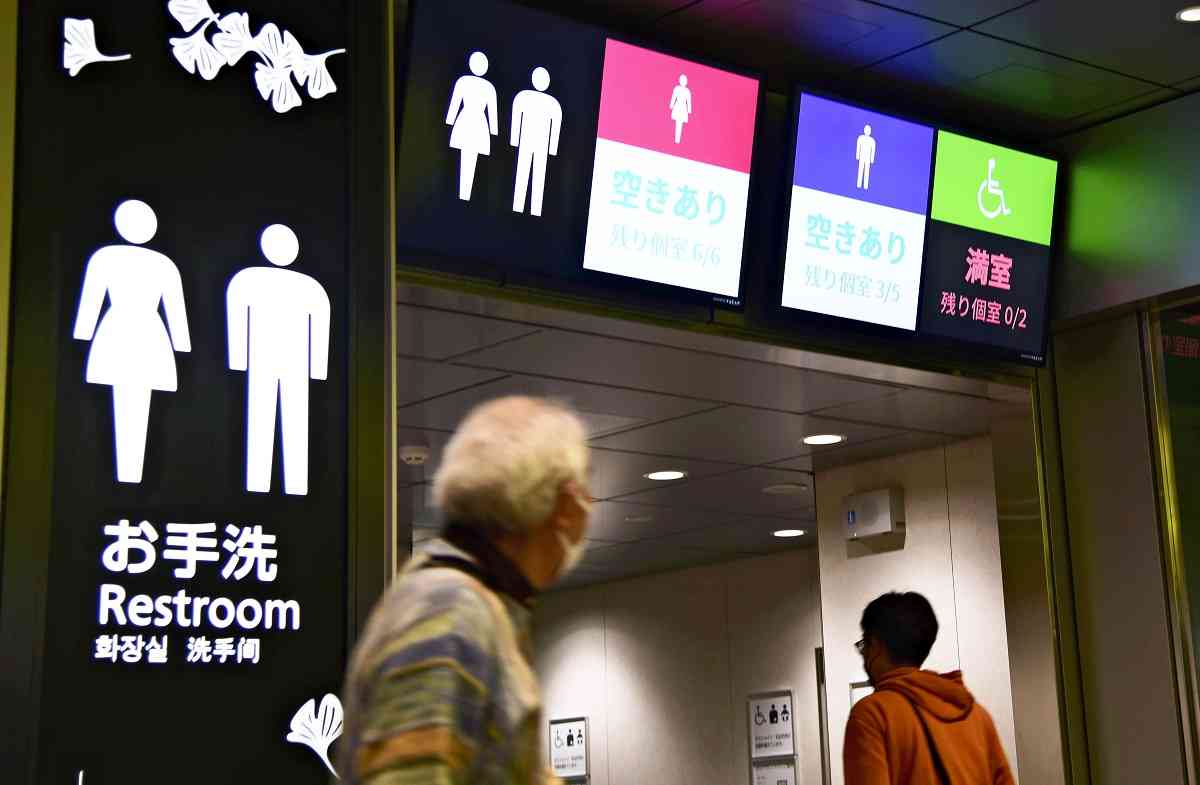
Information on the availability of private restrooms is displayed on an electronic bulletin board at a restroom entrance in Osaka.
12:22 JST, April 29, 2023
So-called “toilet retreats” are becoming something of a talking point. But why do some people use toilet stalls for nonstandard purposes and often for long stretches of time?
Items such as fragments of nori seaweed that most likely came from onigiri rice balls, old magazines and price tags for clothing are occasionally found in the toilets of Yaechika Shopping Mall near Tokyo Station.
“Some people appear to use the toilets for such purposes as eating or getting changed. Cleaners have even reported hearing snoring and music from inside restrooms,” said a person in charge of the facility.
According to Yaechika, each day there are about 30 cases on average in which people use the private spaces for more than 30 minutes, and about four of the cases are for more than an hour.
“The restroom is the only place in the office where I can relax,” said a male office worker in Tokyo. The 28-year-old said he sometimes takes a nap in the restroom, occasionally for more than 30 minutes.
“I feel comfortable in a stall where I can’t be seen by my boss or coworkers. I often end up staying for quite a long time, thinking it’s OK to do so until the other spaces become occupied.”
In 2021, Comany Inc., a partition manufacturer based in Ishikawa Prefecture, surveyed offices in Tokyo and found that the average time spent in a toilet stall was six minutes and 52 seconds for men, and two minutes 32 seconds for women.
“In a survey conducted around 1965, the average times were five minutes for men and 90 seconds for women, so the times have increased,” said Mikiko Takahashi, chief of the company’s research and development section.
While some people unavoidably take longer due to illness or other reasons, many seek a refuge where they do not have to worry about being seen.
“People can more easily relax while alone in a small space surrounded by walls,” said Toyo University Prof. Akihiko Tokaji, an expert in emotional psychology. With the widespread use of smartphones with cameras and recording functions, as well the rise of social media, people are now constantly monitored by others in society. According to the professor, this gives rise to a tendency for people to feel the need to be alone in an out-of-sight place.
“Restrooms may serve as the closest refuge,” Tokaji said.
“The widespread use of Western-style toilets in Japan and their increased performance have made restrooms more comfortable spaces,” said Atsushi Kato, an official at Japan Toilet Labo, a Tokyo-based nonprofit organization. He said that an unintended consequence of nicer restrooms is that more people stay in them for an extremely long time.
Vacan, Inc., an IT company based in Tokyo, has developed a system called “AirKnock” to tackle this issue. Sensors are installed in the doors of toilet stalls to detect when the door is open or closed, and information such as how long the stalls have been occupied and whether other stalls are empty is displayed on a monitor in each one.
Approximately 7,500 units have been installed in offices and commercial facilities since October 2020. According to the company, after the system was installed in the men’s room of a large office building in Tokyo, usage of stalls for more than 30 minutes was reduced by 64%.
Last year, Yaechika installed the system in about 60 toilet stalls to prevent congestion. If a user stays for more than an hour, a message is sent to Yaechika’s emergency response center and other people in charge. Security guards respond by calling out to the user, among other measures.
“Our biggest concern is if a user falls ill and collapses in a stall,” said the person in charge at Yaechika. “We call out to them to make sure they’re safe.”
Electronic notification
There have been some cases where technology has been introduced into restrooms to improve cleaning work efficiency.
JR West Maintec Co. in Osaka, which cleans restrooms at train stations, staggers the cleaning schedule if stalls are occupied. Employees at the company often make rounds at intervals of several tens of minutes, but in some cases, they find stalls continuously occupied and cannot clean them for several hours.
West Japan Railway Co. (JR West) has installed a system jointly developed with Vacan in the restrooms of a new area of Osaka Station that opened on March 18. Sensors have been installed in various locations to enable users to use their smartphones to check availability and even the amount of toilet paper remaining in the stalls. Availability is also displayed on an electronic board at the entrance to the restrooms.
Top Articles in Society
-

Producer Behind Pop Group XG Arrested for Cocaine Possession
-

Man Infected with Measles Reportedly Dined at Restaurant in Tokyo Station
-

Man Infected with Measles May Have Come in Contact with Many People in Tokyo, Went to Store, Restaurant Around When Symptoms Emerged
-

Woman with Measles Visited Hospital in Tokyo Multiple Times Before Being Diagnosed with Disease
-

Australian Woman Dies After Mishap on Ski Lift in Nagano Prefecture
JN ACCESS RANKING
-

Producer Behind Pop Group XG Arrested for Cocaine Possession
-

Japan PM Takaichi’s Cabinet Resigns en Masse
-

Man Infected with Measles Reportedly Dined at Restaurant in Tokyo Station
-

Israeli Ambassador to Japan Speaks about Japan’s Role in the Reconstruction of Gaza
-

Videos Plagiarized, Reposted with False Subtitles Claiming ‘Ryukyu Belongs to China’; Anti-China False Information Also Posted in Japan






















